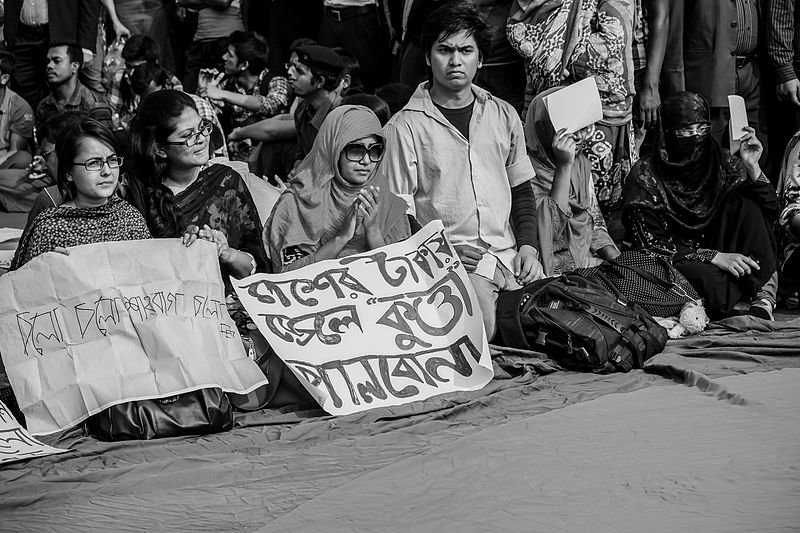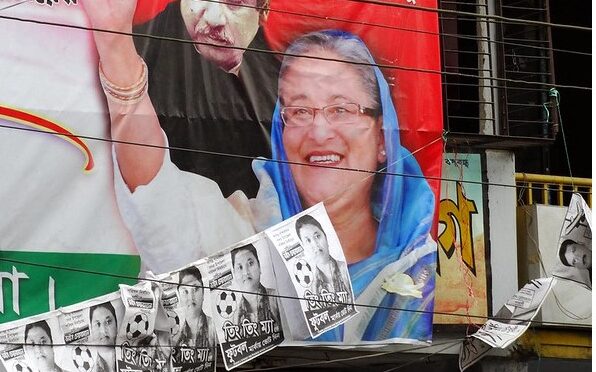
by Ali Riaz : Bangladesh’s politics were extremely volatile throughout 2023 in anticipation of the general election scheduled for January 7, 2024. One of the defining features of Bangladesh’s domestic politics this year were the increasing number of opposition rallies led by the Bangladesh Nationalist Party (BNP). In 2023, violent street clashes between police and protestors, and between activists from both incumbent and opposition parties, rose alongside widespread arrests of opposition leaders and demonstrators. The autocratic political tactics used by the incumbent Bangladesh Awami League (AL), led by Prime Minister Sheikh Hasina, have become increasingly blatant.
Bangladesh’s incumbent party faces pressure from the United States and European Union, who insist on a free, fair, and inclusive election. The economic situation continues to be volatile with dwindling foreign reserves, an increasing trade deficit, and a downward trend in remittances resulting in high inflation and price hikes of essential goods. These crises will exacerbate in the coming year, as the country gears up to experience an election boycotted by major opposition parties and a ruling party that is unlikely to address the root causes of the turmoil.
Turbulent Domestic Politics
Since the beginning of 2023, opposition parties intensified their demand for Prime Minister Sheikh Hasina to resign and install an interim neutral government to oversee the election. The opposition garnered significant support for these proposals after the Awami League won two national elections in 2014 and 2018, condemned by international organizations as neither free nor fair. The opposition parties, although yet to build a common alliance, agreed that an election under the AL government is unacceptable and will only anoint PM Hasina for a fourth consecutive term. The state institutions, such as law enforcement agencies, civil administration, and the judiciary, are expected to support the electoral success of the ruling party as in the two previous elections.
Until October 28, 2023, rallies organized by the opposition had not devolved into violence this year. Police dispersed the massive BNP-led rally with excessive force, using clashes between ruling party activists and police on the one hand, and the BNP activists on the other, as a pretext for restricting BNP’s political activity. The government embarked on a full-scale crackdown on the opposition in the ensuing weeks. In addition to arresting hundreds of BNP activists in the weeks prior to the rally, law enforcement arrested almost all the BNP central leadership, including the party’s secretary general, Mirza Fakhrul Islam Alamgir, who was charged with arson, damage to state property, and violence against members of law enforcement agencies. Law enforcement arrested more than 20,000 opposition activists by mid-December, and more may face charges before the election on January 7, 2024. A cabinet minister who holds a key leadership position in the ruling AL acknowledged in a television interview on December 17, 2023 that the BNP activists were arrested to deter them from engaging in political activities, which implied that the charges of arson and violence brought against them are fictitious.
Police have sealed the BNP headquarters and 53 district offices to hinder any political activities. It appears that the incumbent party has also weaponized the judiciary to deter opposition activity, as verdicts have been delivered in lightning speed, allegedly subverting due process. According to a forum of pro-BNP lawyers, the judiciary has convicted more than 1,200 activists since August.
These legal and extra-legal measures by the government were accompanied by coercion of opposition candidates, which demonstrates that the incumbent party is orchestrating the appearance of healthy political opposition. Among other examples of coercion, a ruling party leader admitted that imprisoned opposition leaders were assured they would be released if they agreed to participate in the polls. The intelligence agencies have reportedly become engaged in the process, as chiefs of three agencies met the Chief Election Commissioner (CEC) ahead of announcement of the election schedule. The AL has also set up “dummy candidates” as independents, and shared seats with various political parties. A BNP Vice President, who was arrested during the October 28 rally, was dramatically granted bail a day before the election nomination deadline and became a ruling party candidate. A few other individuals and parties succumbed to the pressure: of 43 registered parties, 29 joined the election, while 15 parties including BNP decided to boycott. At the end of the year, the country is heading towards an election which all observers assume will deliver a victory to the incumbent, PM Hasina.
Rebranding a Repressive Law
In August 2023, the government scrapped the controversial Digital Security Act (DSA) and replaced it with a new law called the Cyber Security Act (CSA) which will continue to limit the freedom of expression and muzzle the media. Since its introduction in October 2018, the DSA was widely criticized by international and human rights organizations at home and abroad as a tool for the AL and its supporters to muzzle freedom of the press and online speech critical of the government. Though the government denied that it abused the law, Law Minister Anisul Huq informed the parliament that between October 2018 and January 2023, at least 7,000 cases were filed under the law.
The new Cyber Security Act, which human rights observers have described as “old wine in a new bottle,” includes all the repressive provisions of the previous law. It allows law enforcement to arrest any individual before trial, only based on suspicion or allegation, and seize their devices without any warrant. In March, authorities arrested the widely respected editor of the country’s most circulated newspaper, Matiur Rahman, and a reporter from the same paper, prompting UN Human Rights Chief Volker Türk to call on Bangladesh to immediately suspend the law.

Great Power Tug-of-War
Strained relations between the United States and Prime Minister Hasina over the U.S. request to hold free, fair, and inclusive elections, alongside the diplomatic support provided by partners Russia, China, and India, show the growing importance of Bangladesh in the Indo-Pacific region and the choices it faces as a site of geopolitical contestation. The new visa policy announced by the U.S. government in May, and the lack of invitation to the White House’s Democracy Summit, revealed strained relations between the United States and Bangladesh. The new visa policy said that the United States would deny a visa to anyone obstructing the democratic election processes in Bangladesh. Over several high-level diplomatic meetings, U.S. officials warned PM Hasina and other government officials that the erosion of democracy in any country limits Washington’s ability to cooperate with that country. In response to calls for an inclusive election by the United States and European Union, PM Hasina alleged that the Washington does not want her in power, additionally citing the sanctions the United States placed on Bangladesh’s Rapid Action Battalion.
Russia stood by PM Hasina, alleging that Washington is meddling in Bangladeshi politics. China offered unqualified support for the incumbent party and insisted that the stability of the country is its priority as an economic partner. India, the primary backer of the Hasina government since 2009, expressed diplomatic support and invited her to be an observer to the G-20 Summit held in New Delhi in September. China’s support for the AL government stems from three factors: Bangladesh is a signatory to the Belt and Road Initiative (BRI) since 2016 as a gateway to the Indian Ocean, it has made significant investments in various infrastructure projects, and it views partnership with Bangladesh as an opportunity to curb India and the United States’ influence in the region.
Economy in Deep Crisis
Bangladesh’s economy continues to slide towards a crisis despite the support the country received from multilateral institutions in the last year, such as the International Monetary Fund. The IMF approved a USD $4.7 billion package in January, disbursing two of the seven installments scheduled to be released over a period of three and a half years. However, before the IMF released the second installment, it noted that Bangladesh had failed to make the necessary reforms that are requested as a part of IMF assistance. One of these conditions was to maintain a healthy foreign reserve, which dwindled to less than USD $16 billion from a high of USD $32 billion in February 2023.
In addition, the government has continued to borrow money from external and domestic sources to fund various developments projects and pay for imports, allowing its external debt to reach USD $100 billion by October. One of the critical problems with this strategy is that the debt Bangladesh owes to bilateral and multilateral lenders will increase from USD $2.8 billion to USD $3.6 billion in the current fiscal year. Such a high rate of debt obligations will drain off Bangladesh’s foreign exchange reserves, further increasing inflation and the already high cost of essentials in the coming year.
In the face of a decrease in foreign reserves, increase in debt obligations, and growing external and domestic loans, the government adopted a policy of import control. This is damaging economic growth, causing inflation to rise above 9 percent and significant price hikes in essential goods, such as food and fuel. The level of exports, remittances, trade and short-term credits have not been able to balance the outflux of cash for Bangladesh to pay off its debt and the cost of crucial imports. These problems have led three rating companies to downgrade Bangladesh’s sovereign credit rating. This is a clear sign that international investors are anticipating that Bangladesh’s economy will be even more vulnerable in the coming year.
Standing at the crossroads
As Bangladesh enters the new year, the country is scheduled to hold an election that will likely deliver victory to the incumbent party. Evidence continues to emerge that the election will not be free nor fair, and even international media has described the elections as a “farce.” Major opposition parties have decided to boycott the election, an indicator that the upcoming election results will trigger a legitimacy crisis. The ruling party is likely to increase its use of autocratic tactics to suppress any growing political discontent among citizens, only accentuated by economic hardship. The ongoing crackdown on political critics indicates that the Awami League may seek to decimate all formidable opponents to create a one-party state, similar to Cambodia’s government.
Bangladesh is therefore standing at a crossroads – either it will go down the path of a closed autocracy in the years after the 2024 election, or acquiesce to international pressure to reverse its course. The choice appears to be one factor, among many, that represent the accelerating competition between the United States, Russia, China, and India for influence over Bangladesh’s role in the region.
What remains to be seen is how Western nations, especially the United States, react to the election’s likely outcome. U.S. actions will have significant economic and political impacts on the domestic situation, considering that the United States is the largest single country market of Bangladesh’s readymade garments, and the largest source of its foreign direct investment (FDI). With the economic trajectory looking increasingly grim, the combination of contentious domestic and foreign politics and economic uncertainty will make Bangladesh’s coming year more volatile.
